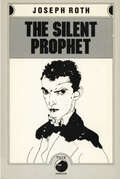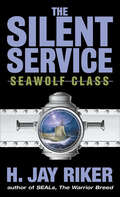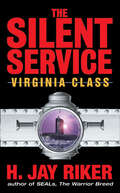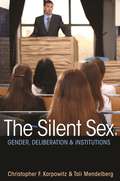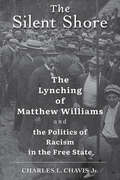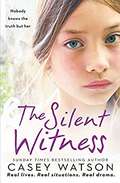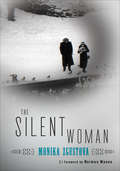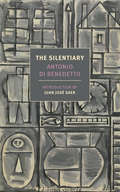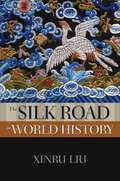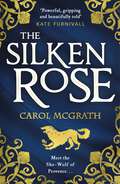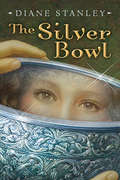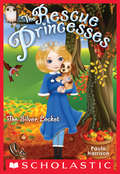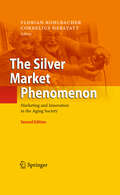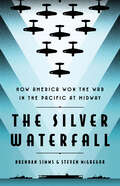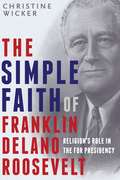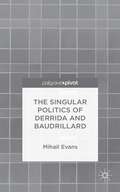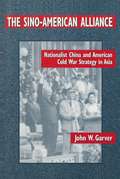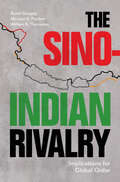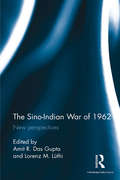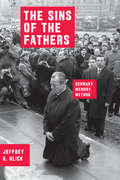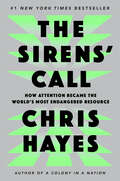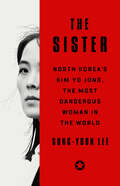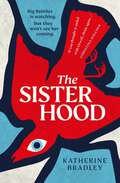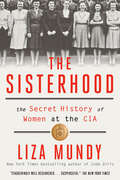- Table View
- List View
The Silent Prophet
by Joseph RothThe renowned author of The Radetzky March examines the mind of a Russian Revolutionary and the limitations of ideology in this classic n ovel.Based on his own observations during an extended stay in Moscow in the winter of 1926, The Silent Prophet is Joseph Roth’s vivid attempt to explain the Russian Revolution and its betrayal by exposing the personal motivations of its leaders. Written at the height of speculation about the fate of Marxist Revolutionary Leon Trotsky, it is a brilliant portrayal of revolutionary idealism-turned-cynicism.The illegitimate and rootless Friedrich Kargan—the Trotsky figure—becomes a leader of the Red Army during the civil war. But he soon realizes that the ideals he fought for were already lost. after openly defying the coldly amoral Savelli—the novel’s Stalin figure—Kargan is sent into exile in Siberia.
The Silent Service: Seawolf Class (Silent Service Ser. #2)
by H. Jay RikerIn the ocean depths, America's warriors ceaselessly patrol the dark territory on freedom's outer edge. These are the battles fought in silence . . . and in secret. The newest fight begins when the People's Republic of China buys a fleet of highly stealthy and deadly attack subs from a cash-hungry Russia and takes advantage of international unrest to lay claim to territories they have long considered their own. US Commander Tom Garrett is asked to serve as Executive Officer on board the USS Seawolf to monitor the PRC's activities as they use all the firepower necessary to close the Straits of Taiwan in preparation for invading their "renegade province." As the Chinese fleet moves in for attack, it's left to Commander Garrett to sink the Chinese boats, break the PRC siege of Taiwan, and avenge those who were lost in the struggle.
The Silent Service: Virginia Class (Silent Service Ser. #3)
by H. Jay RikerA crew of American naval submariners go up against an unidentified terrorist threat in this military thriller from a U.S. Navy veteran.The U.S.S. Virginia— the first in the most technologically advanced new class of U.S. attack submarines—sets sail, even as the Navy’s high-tech submarine program falls under attack from a Congress ready to cut military spending. But a threat no one anticipated is gliding silently through dangerous waters. A rogue Kilo-class submarine built by a shadowy and powerful ally has become the latest weapon in al Qaeda’s terrorist arsenal. The submarine’s brutal strikes have created a volatile hostage situation in the Pacific . . . and have left hundreds of people dead.This new and stealthy terrorist threat must be eliminated before more innocent lives are lost. But the officers, crew, and Navy SEALs aboard the Virginia will face more than they anticipated in the turbulent waters of the South China Sea—as one untried American sub races toward an explosive confrontation with a cunning, and ruthless enemy.
The Silent Sex: Gender, Deliberation, and Institutions
by Tali Mendelberg Christopher F. KarpowitzDo women participate in and influence meetings equally with men? Does gender shape how a meeting is run and whose voices are heard? The Silent Sex shows how the gender composition and rules of a deliberative body dramatically affect who speaks, how the group interacts, the kinds of issues the group takes up, whose voices prevail, and what the group ultimately decides. It argues that efforts to improve the representation of women will fall short unless they address institutional rules that impede women's voices.Using groundbreaking experimental research supplemented with analysis of school boards, Christopher Karpowitz and Tali Mendelberg demonstrate how the effects of rules depend on women’s numbers, so that small numbers are not fatal with a consensus process, but consensus is not always beneficial when there are large numbers of women. Men and women enter deliberative settings facing different expectations about their influence and authority. Karpowitz and Mendelberg reveal how the wrong institutional rules can exacerbate women’s deficit of authority while the right rules can close it, and, in the process, establish more cooperative norms of group behavior and more generous policies for the disadvantaged. Rules and numbers have far-reaching implications for the representation of women and their interests.Bringing clarity and insight to one of today’s most contentious debates, The Silent Sex provides important new findings on ways to bring women’s voices into the conversation on matters of common concern.
The Silent Shore: The Lynching of Matthew Williams and the Politics of Racism in the Free State
by Charles L. Chavis Jr.The definitive account of the lynching of twenty-three-year-old Matthew Williams in Maryland, the subsequent investigation, and the legacy of "modern-day" lynchings.On December 4, 1931, a mob of white men in Salisbury, Maryland, lynched and set ablaze a twenty-three-year-old Black man named Matthew Williams. His gruesome murder was part of a wave of silent white terrorism in the wake of the stock market crash of 1929, which exposed Black laborers to white rage in response to economic anxieties. For nearly a century, the lynching of Matthew Williams has lived in the shadows of the more well-known incidents of racial terror in the deep South, haunting both the Eastern Shore and the state of Maryland as a whole. In The Silent Shore, author Charles L. Chavis Jr. draws on his discovery of previously unreleased investigative documents to meticulously reconstruct the full story of one of the last lynchings in Maryland. Bringing the painful truth of anti-Black violence to light, Chavis breaks the silence that surrounded Williams's death. Though Maryland lacked the notoriety for racial violence of Alabama or Mississippi, he writes, it nonetheless was the site of at least 40 spectacle lynchings after the abolition of slavery in 1864. Families of lynching victims rarely obtained any form of actual justice, but Williams's death would have a curious afterlife: Maryland's politically ambitious governor Albert C. Ritchie would, in an attempt to position himself as a viable challenger to FDR, become one of the first governors in the United States to investigate the lynching death of a Black person. Ritchie tasked Patsy Johnson, a member of the Pinkerton detective agency and a former prizefighter, with going undercover in Salisbury and infiltrating the mob that murdered Williams. Johnson would eventually befriend a young local who admitted to participating in the lynching and who also named several local law enforcement officers as ringleaders. Despite this, a grand jury, after hearing 124 witness statements, declined to indict the perpetrators. But this denial of justice galvanized Governor Ritchie's Interracial Commission, which would become one of the pioneering forces in the early civil rights movement in Maryland.Complicating historical narratives associated with the history of lynching in the city of Salisbury, The Silent Shore explores the immediate and lingering effect of Williams's death on the politics of racism in the United States, the Black community in Salisbury, the broader Eastern Shore, the state of Maryland, and the legacy of "modern-day lynchings."
The Silent Witness
by Casey Watson'I'm so sorry, Casey,' my link worker John said, sounding weary. 'I know this is probably the worst time I could ring you, but we desperately need someone to take a child tonight. ' It's the night before Christmas when Casey and Mike get the call. A twelve year old girl, stuck between a rock and a hard place. Her father is on a ventilator, fighting for his life, while her mother is currently on remand in prison. Despite claiming she attacked him in self-defence, she's been charged with his attempted murder. The girl is called Bella, and she's refusing to say anything. The trouble is that she is also the only witness. . .
The Silent Woman
by Monika ZgustovaThis &“exhilarating novel&” of love, longing, and exile &“captures the passion of a century in turmoil&” (Rahna Reiko Rizzuto, author of Hiroshima in the Morning). From the &“outstanding&” Czech writer Monika Zgustova, The Silent Woman depicts a twentieth-century woman&’s life against a backdrop of war and political turmoil (Vaclav Havel). Sylva, half Czech and half German, is born into an aristocratic family and lives in a castle outside Prague. She marries a man she doesn&’t love and is seduced by the joyful madness of Paris in the 1920s as an ambassador&’s wife. When the Nazis force her to state her loyalty, she capitulates, not realizing how this decision will inform and haunt the rest of her life. Sylva&’s story is interwoven with that of her son Jan, a world-renowned mathematician and Russian emigre living in the United States, who exudes the restlessness of a man without a country. With insight and candor, Zgustova weaves a multigenerational narrative of the consequences of moral choices and how individuals come to terms with their own forms of exile.
The Silentiary
by Antonio Di BenedettoIn post-WWII South America, a struggling writer embarks on a murderous thought experiment to help kickstart his career in this next tale of longing from the author of Zama. The Silentiary takes place in a nameless Latin American city during the early 1950s. A young man employed in middle management entertains an ambition to write a book of some sort. But first he must establish the necessary precondition, which the crowded and noisily industrialized city always denies him, however often he and his mother and wife move in search of it. He thinks of embarking on his writing career with something simple, a detective novel, and ponders the possibility of choos- ing a victim among the people he knows and planning a crime as if he himself were the killer. That way, he hopes, his book might finally begin to take shape.The Silentiary, along with Zama and The Suicides, is one of the three thematically linked novels by Di Benedetto that have come to be known as the Trilogy of Expectation, after the dedication &“To the victims of expectation&” in Zama. Together they constitute, in Juan José Saer&’s words, &“one of the culminating moments of twentieth-century narrative fiction in Spanish.&”
The Silk Road in World History
by Xinru LiuThe Silk Road was the contemporary name for a complex of ancient trade routes linking East Asia with Central Asia, South Asia, and the Mediterranean world. This network of exchange emerged along the borders between agricultural China and the steppe nomads during the Han Dynasty (206BCE-220CE), in consequence of the inter-dependence and the conflicts of these two distinctive societies. In their quest for horses, fragrances, spices, gems, glassware, and other exotics from the lands to their west, the Han Empire extended its dominion over the oases around the Takla Makan Desert and sent silk all the way to the Mediterranean, either through the land routes leading to the caravan city of Palmyra in Syria desert, or by way of northwest India, the Arabian Sea and the Red Sea, landing at Alexandria. The Silk Road survived the turmoil of the demise of the Han and Roman Empires, reached its golden age during the early middle age, when the Byzantine Empire and the Tang Empire became centers of silk culture and established the models for high culture of the Eurasian world. The coming of Islam extended silk culture to an even larger area and paved the way for an expanded market for textiles and other commodities. By the 11th century, however, the Silk Road was in decline because of intense competition from the sea routes of the Indian Ocean. Using supply and demand as the framework for analyzing the formation and development of the Silk Road, the book examines the dynamics of the interactions of the nomadic pastoralists with sedentary agriculturalists, and the spread of new ideas, religions, and values into the world of commerce, thus illustrating the cultural forces underlying material transactions. This effort at tracing the interconnections of the diverse participants in the transcontinental Silk Road exchange will demonstrate that the world had been linked through economic and ideological forces long before the modern era.
The Silken Rose: The spellbinding and completely gripping new story of England's forgotten queen . . . (The She-Wolves Trilogy #1)
by Carol McGrathThey called her the She-Wolf From Provence. She'd shape the destiny of England ...Fans of Alison Weir, Anne O'Brien and Philippa Gregory, will devour this compelling new novel, starring one of English history's most fierce and courageous forgotten heroines!'Powerful, gripping and beautifully told' - Kate Furnivall, author of The Liberation'A feast for the senses and highly recommended' - Deborah Swift, author of Pleasing Mr Pepys'Well-researched . . . Fascinating' - Joanna CourtneyREADERS LOVE THE SILKEN ROSE!***** 'Stunning start to a new series of She-Wolf Queens'***** 'Spectacular . . . I will recommend this first part of her new trilogy to everyone'***** 'Fabulous . . . A lovely, highly researched tale'***** 'Exceptionally well-written . . . From the first page I was totally caught up in the story'1236. Ailenor of Provence, cultured and intelligent, is only thirteen when she meets her new husband, Henry III of England. A foreign and friendless princess in a strange land she is determined to please him. And she knows that when the times comes she must provide an heir, to secure the throne against those who would snatch it away. Rosalind, a commoner skilled in the arts of needlework and embroidery, catches the young queen's attention and a friendship blossoms. But she is unprepared for the dangerous ramifications of winning the queen's favour ... As closeness, and soon love, develops between Ailenor and Henry, so too does her influence on her husband and her power at court. As France and Wales provide constant threat, and England's barons increasingly resent her influence, Ailenor must learn to be ruthless. Who should she encourage her husband to favour? Who can she trust? Caught in a web of treachery and deceit, her choices will define the fate of England. To protect her close friends, and her beloved children, Ailenor, the She-Wolf from Provence, would do, and endure, anything ... AND DISCOVER THE DAMASK ROSE: THE SUMPTUOUS AND GRIPPING NEW NOVEL FROM CAROL MCGRATHCOMING APRIL 2021: AVAILABLE FOR PREORDER NOW!
The Silken Rose: The spellbinding and completely gripping new story of England's forgotten queen . . . (The\rose Trilogy Ser. #1)
by Carol McGrathThey called her the She-Wolf From Provence. She'd shape the destiny of England ...Fans of Alison Weir, Anne O'Brien and Philippa Gregory, will devour this compelling new novel, starring one of English history's most fierce and courageous forgotten heroines!'Powerful, gripping and beautifully told' - Kate Furnivall, author of The Liberation'A feast for the senses and highly recommended' - Deborah Swift, author of Pleasing Mr Pepys'Well-researched . . . Fascinating' - Joanna CourtneyREADERS LOVE THE SILKEN ROSE!***** 'Stunning start to a new series of She-Wolf Queens'***** 'Spectacular . . . I will recommend this first part of her new trilogy to everyone'***** 'Fabulous . . . A lovely, highly researched tale'***** 'Exceptionally well-written . . . From the first page I was totally caught up in the story'1236. Ailenor of Provence, cultured and intelligent, is only thirteen when she meets her new husband, Henry III of England. A foreign and friendless princess in a strange land she is determined to please him. And she knows that when the times comes she must provide an heir, to secure the throne against those who would snatch it away. Rosalind, a commoner skilled in the arts of needlework and embroidery, catches the young queen's attention and a friendship blossoms. But she is unprepared for the dangerous ramifications of winning the queen's favour ... As closeness, and soon love, develops between Ailenor and Henry, so too does her influence on her husband and her power at court. As France and Wales provide constant threat, and England's barons increasingly resent her influence, Ailenor must learn to be ruthless. Who should she encourage her husband to favour? Who can she trust? Caught in a web of treachery and deceit, her choices will define the fate of England. To protect her close friends, and her beloved children, Ailenor, the She-Wolf from Provence, would do, and endure, anything ... AND DISCOVER THE DAMASK ROSE: THE SUMPTUOUS AND GRIPPING NEW NOVEL FROM CAROL MCGRATHCOMING APRIL 2021: AVAILABLE FOR PREORDER NOW!
The Silver Bowl
by Diane StanleyUnwanted at home, Molly goes to work for the king of Westria as a humble scullery maid. She arrives at the castle with no education, no manners, and a very disturbing secret: She sees visions, and those visions always come true. One day, while she's working in the king's great hall, young Prince Alaric passes by. Molly finds him unbearably handsome-but also unbearably rude. But what does it really matter? She'll probably never see him again. In time Molly is promoted to polishing silver and is given a priceless royal treasure to work on: the king's great ceremonial hand basin. But there's something odd about it. The silver warms to her touch, a voice commands her to watch and listen, and then the visions appear. They tell the story of a dreaded curse that has stalked the royal family for years. There have already been deaths; soon there will be more. As tragedy after tragedy strikes the royal family, Molly can't help but wonder: Will the beautiful Alaric be next? Together with her friends Tobias and Winifred, Molly must protect the prince and destroy the curse. Could a less likely champion be found to save the kingdom of Westria?
The Silver Locket: The Silver Locket (The Rescue Princesses #9)
by Paula HarrisonThese are no ordinary princesses--they're Rescue Princesses!Rosalind and the other princesses are in the Kingdom of Taldonia for the Autumn Ball. They all love playing with an adorable puppy named Patch. When a misunderstanding turns into an argument, Rosalind sets off on her own. After Patch is dognapped, Rosalind needs the other Rescue Princesses to help find him! Can she save Patch and get her friends back at the same time?
The Silver Market Phenomenon: Marketing and Innovation in the Aging Society
by Cornelius Herstatt Florian KohlbacherThe current shift in demographics - aging and shrinking populations - in many countries around the world presents a major challenge to companies and societies alike. One particularly essential implication is the emergence and constant growth of the so-called "graying market" or "silver market", the market segment more or less broadly defined as those people aged 50 and older. Increasing in number and share of the total population while at the same time being relatively well-off, this market segment can be seen as very attractive and promising, although still very underdeveloped in terms of product and service offerings. This book offers a thorough and up-to-date analysis of the challenges and opportunities in leveraging innovation, technology, product development and marketing for older consumers and employees. Key lessons are drawn from a variety of industries and countries, including the lead market Japan.
The Silver Waterfall: How America Won the War in the Pacific at Midway
by Brendan Simms Steven McGregorEighty years after the stunning and decisive battle, a revelatory new history of MidwayThe Battle of Midway was, on paper, an improbable victory for the smaller, less experienced American navy and air force, so much so that it was quickly described as &“a miracle.&” Yet fortune favored the Americans at Midway, and the conventional wisdom has it that the Americans&’ lucky streak continued as the war in the Pacific turned against the Japanese. This new history demonstrates that luck, let alone miracles, had little to do with it. In The Silver Waterfall, Brendan Simms and Steven McGregor show how the efforts of America&’s peacetime navy combined with creative innovations made by designers and industrialists were largely responsible for the victory. The Douglas Dauntless Dive Bomber, a uniquely conceived fighting weapon, delivered a brutally accurate attack the Japanese quickly came to dread. Told through a vivid narrative, Simms and McGregor show how the course of the war in the Pacific was dramatically altered, emphasizing the crucial combination of a culture of innovation, a brilliant contribution from immigrants, and a vital intelligence coup that allowed the navy to orchestrate the devastating attack on the Japanese and dominate the Pacific for good.
The Simple Faith of Franklin Delano Roosevelt: Religion's Role in the FDR Presidency
by Christine WickerIn The Simple Faith of Franklin Delano Roosevelt, religion journalist and author Christine Wicker establishes that faith was at the heart of everything Roosevelt wanted for the American people. This powerful book is the first in-depth look at how one of America's richest, most patrician presidents became a passionate and beloved champion of the downtrodden--and took the country with him. Those who knew Roosevelt best invariably credited his spiritual faith as the source of his passion for democracy, justice, and equality. Like many Americans of that time, his beliefs were simple. He believed the God who heard his prayers and answered them expected him to serve others. He anchored his faith in biblical stories and teachings. During times so hard that the country would have followed him anywhere, he summoned the better angels of the American character in ways that have never been surpassed.
The Singular Politics of Derrida and Baudrillard
by Mihail EvansRecent years have seen the rise of anti-politics as a political phenomenon. Beyond this new rejection of the political class there has long existed a deeper challenge to the political itself. Identifying the work of Derrida as 'a politics' and that of Baudrillard as 'transpolitics' this book charts convergences and divergences in their approaches.
The Sino-American Alliance: Nationalist China and American Cold War Strategy in Asia
by John W. GarverThis study provides an analysis of the role the United States alliance with Nationalist China played in US strategy to contain first the Sino-Soviet alliance and then China during the 1950s and 1960s.
The Sino-Indian Rivalry: Implications for Global Order
by William R. Thompson Šumit Ganguly Manjeet S. PardesiDrawing on a wide body of literature on international rivalries, this comprehensive and theoretically grounded work explains the origins and evolution of the Sino-Indian rivalry. Contrary to popular belief, the authors argue that the Sino-Indian rivalry started almost immediately after the emergence of the two countries in the global arena. They demonstrate how the rivalry has systemic implications for both Asia and the global order, intertwining the positional and spatial dimensions that lie at the heart of the Sino-Indian relationship. Showing how this rivalry has evolved from the late 1940s to the present day, the essays in this collection underscore its significance for global politics and highlight how the asymmetries between India and China have the potential to escalate conflict in the future.
The Sino-Indian War of 1962: New perspectives
by Lorenz M. Lüthi Amit R. Das GuptaThe Sino-Indian border war of 1962 forms a major landmark in South Asian, Asian and Cold War history. Among others, it resulted in an unresolved conflict permanently hindering rapprochement between China and India, the establishment of the Sino-Pakistani axis, the deepening of the Sino-Soviet split and had a lasting impact on Indian domestic affairs. This volume draws on new documentary evidence to re-evaluate perceptions, motivations and decision-making processes of both antagonists, but also of third powers immediately affected by the conflict. It also investigates the effect on India’s internal politics, its Constitution, the Communist Party of India and the fate of Indians of Chinese origin. Finally, it analyses how the conflict is viewed in India today and its ramifications for India–China relationship. A major intervention in the Asian historical landscape, this book will be indispensable to scholars and researchers of modern history, especially of modern South Asia and China, international relations, defence and strategic studies, international politics and government. It will also be useful for think-tanks and government agencies.
The Sins of the Fathers: Germany, Memory, Method
by Jeffrey K. OlickNational identity and political legitimacy always involve a delicate balance between remembering and forgetting. All nations have elements in their past that they would prefer to pass over--the catalog of failures, injustices, and horrors committed in the name of nations, if fully acknowledged, could create significant problems for a country trying to move on and take action in the present. Yet denial and forgetting carry costs as well. Nowhere has this precarious balance been more potent, or important, than in the Federal Republic of Germany, where the devastation and atrocities of two world wars have weighed heavily in virtually every moment and aspect of political life. The Sins of the Fathers confronts that difficulty head-on, exploring the variety of ways that Germany's leaders since 1949 have attempted to meet this challenge, with a particular focus on how those approaches have changed over time. Jeffrey K. Olick asserts that other nations are looking to Germany as an example of how a society can confront a dark past--casting Germany as our model of difficult collective memory.
The Sirens' Call: How Attention Became the World's Most Endangered Resource
by Chris HayesFrom the New York Times bestselling author and MSNBC and podcast host, a powerful wide-angle reckoning with how the assault from attention capitalism on our minds and our hearts has reordered our politics and the very fabric of our society. <p> We all feel it—the distraction, the loss of focus, the addictive focus on the wrong things for too long. We bump into the zombies on their phones in the street, and sometimes they’re us. We stare in pity at the four people at the table in the restaurant, all on their phones, and then we feel the buzz in our pocket. Something has changed utterly: for most of human history, the boundary between public and private has been clear, at least in theory. <p> Now, as Chris Hayes writes, “With the help of a few tech firms, we basically tore it down in about a decade.” Hayes argues that we are in the midst of an epoch-defining transition whose only parallel is what happened to labor in the nineteenth century: attention has become a commodified resource extracted from us, and from which we are increasingly alienated. The Sirens’ Call is the big-picture vision we urgently need to offer clarity and guidance. Because there is a breaking point. <p> Sirens are designed to compel us, and now they are going off in our bedrooms and kitchens at all hours of the day and night, doing the bidding of vast empires, the most valuable companies in history, built on harvesting human attention. As Hayes writes, “Now our deepest neurological structures, human evolutionary inheritances, and social impulses are in a habitat designed to prey upon, to cultivate, distort, or destroy that which most fundamentally makes us human.” <p> The Sirens’ Call is the book that snaps everything into a single holistic framework so that we can wrest back control of our lives, our politics, and our future. <b>New York Times Bestseller</b>
The Sister: North Korea's Kim Yo Jong, the Most Dangerous Woman in the World
by Sung-Yoon LeeThis first book on Kim Jong Un&’s increasingly powerful sister, tapped to be his successor, offers jaw-dropping insights into the latest generation of North Korea&’s secretive and murderous dynasty. The first woman ever to issue the threat of a nuclear weapons strike is not even officially a head of state. Kim Yo Jong is the sister of North Korea&’s Supreme Leader Kim Jong Un and, as their murderous regime&’s chief propagandist, internal administrator, and foreign policymaker, she is the most powerful woman in North Korean history. Cruel but charming, she threatens and insults foreign leaders with sardonic wit, issuing proclamations and denunciations in her own name, a first for any woman in the Korean royal family. She memorably called the South Korean Defense Minister &“a senseless and scum-like guy&” before going on to promise South Korea &“a miserable fate little short of total destruction and ruin&”. A princess by birth with great expectations for her macabre kingdom, she was brought up to believe it is her mission to reunite North Korea with the South or die trying. She&’s ruthless and incredibly dangerous. The Sister, written by Sung-Yoon Lee, a scholar of Korean and East Asian studies and a specialist on North Korea, is a fascinating, authoritative account of the mysterious world of North Korea and its ruling dynasty—a family whose lust for power entails the brutal repression of civilians, a missile program that can reach the continental US, and the constant threat of global havoc.
The Sisterhood: Big Brother is watching. But they won't see her coming.
by Katherine BradleyPRE-ORDER THE INSTITUTE, THE NEW HIGH-CONCEPT PSYCHOLOGICAL THRILLER BY KATHERINE BRADLEY, OUT SPRING 2025. &‘Frightening and timely, Bradley&’s The Sisterhood is the book everyone should read this year. If you thought it ended with Orwell, think again . . .' CHRISTINA DALCHERVox meets The Handmaid&’s Tale in this feminist reimagining of 1984 In Oceania, whoever you are, Big Brother is always watching you and trust is a luxury that no one has. Julia is the seemingly perfect example of what women in Oceania should be: dutiful, useful, subservient, meek. But Julia hides a secret. A secret that would lead to her death if it is discovered. For Julia is part of the underground movement called The Sisterhood, whose main goal is to find members of The Brotherhood, the anti-Party vigilante group, and help them to overthrow Big Brother. Only then can everyone be truly free. When Julia thinks she&’s found a potential member of The Brotherhood, it seems like their goal might finally be in their grasp. But as she gets closer to Winston Smith, Julia&’s past starts to catch up with her and we soon realise that she has many more secrets than we&’d first imagined – and that overthrowing Big Brother might cost her everything – but if you have nothing left to lose then you don&’t mind playing the game . . . This is a story about love, about family, about being a woman, a mother, a sister, a friend and ultimately about what you would sacrifice for the greater good. 'Fast-paced and suspenseful . . . The Sisterhood's greatest gift, however, may be in its message of hope, capable of surmounting even the most formidable of odds and the most uncertain of futures' KATHERINE J. CHEN, author of Joan 'A gut-wrenching, heart-breaking journey through the looking glass of 1984. Compulsively written, Julia&’s is a story begging to be told' FREYA BERRY, author of The Dictator's Wife 'A shockingly relevant take on a classic' CLAIRE MCGOWAN, author of This Could Be Us 'A dazzling retelling of the classic dystopian novel, which raises profound questions about how society works, and whether or not woman have political agency. I found it memorable, deeply moving, and at times, terrifying' KATE RHODES, author of the Ben Kitto series 'Katherine Bradley has delivered a worthy counterpart to George Orwell's 1984 in this chilling, taut book. It's as claustrophobic as it needs to be; particularly frightening as one looks around and sees that we are voluntarily moving towards Orwell's nightmare. It is nothing short of a triumph' MARA TIMON, author of City of Spies &‘In this highly original take on Orwell&’s 1984– the Big Brother of all dystopian classics – Bradley weaves a complex and engaging plot around the idea of a female resistance to oppressive overlords. Oppressive and creepy, but with real heart&’ A. K. TURNER, author of Body Language
The Sisterhood: The Secret History of Women at the CIA
by Liza MundyThe acclaimed author of Code Girls returns with a &“rip-roaring&” (Steve Coll), &“staggeringly well-researched&” (The New York Times) history of three generations at the CIA, &“electric with revelations&” (Booklist) about the women who fought to become operatives, transformed spycraft, and tracked down Osama bin Laden.&“This masterful book cements Liza Mundy as one of our foremost historians.&”—Kate Moore, bestselling author of The Radium GirlsOne of Kirkus Reviews&’ Most Anticipated Books of the FallCreated in the aftermath of World War II, the Central Intelligence Agency relied on women even as it attempted to channel their talents and keep them down. Women sent cables, made dead drops, and maintained the agency&’s secrets. Despite discrimination—even because of it—women who started as clerks, secretaries, or unpaid spouses rose to become some of the CIA&’s shrewdest operatives.They were unlikely spies—and that&’s exactly what made them perfect for the role. Because women were seen as unimportant, pioneering female intelligence officers moved unnoticed around Bonn, Geneva, and Moscow, stealing secrets from under the noses of their KGB adversaries. Back at headquarters, women built the CIA&’s critical archives—first by hand, then by computer. And they noticed things that the men at the top didn&’t see. As the CIA faced an identity crisis after the Cold War, it was a close-knit network of female analysts who spotted the rising threat of al-Qaeda—though their warnings were repeatedly brushed aside.After the 9/11 attacks, more women joined the agency as a new job, targeter, came to prominence. They showed that data analysis would be crucial to the post-9/11 national security landscape—an effort that culminated spectacularly in the CIA&’s successful effort to track down bin Laden in his Pakistani compound.Propelled by the same meticulous reporting and vivid storytelling that infused Code Girls, The Sisterhood offers a riveting new perspective on history, revealing how women at the CIA ushered in the modern intelligence age, and how their silencing made the world more dangerous.
